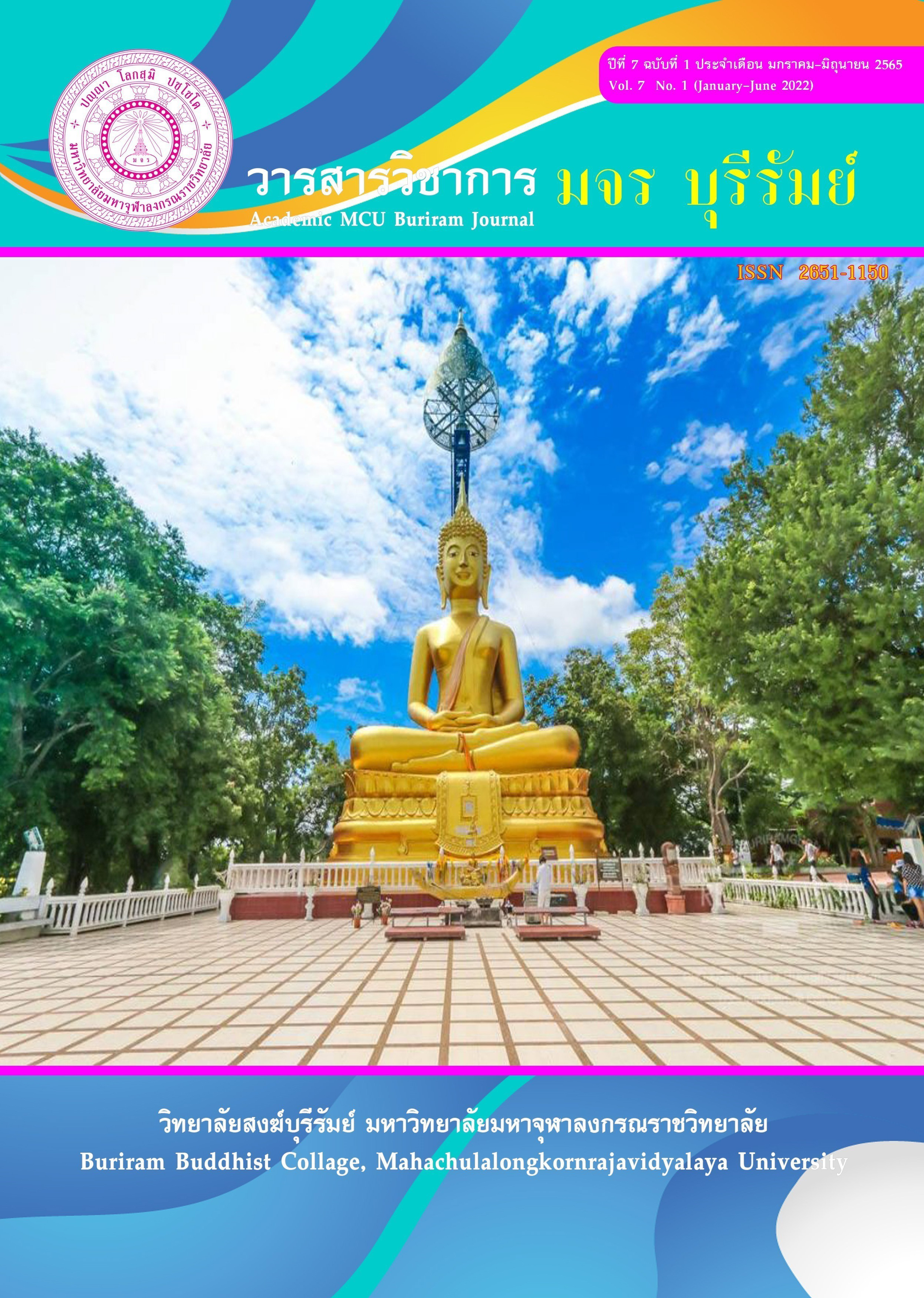Promoting the Happiness of the Monks in a New Normal of Life Society, Chaiyaphum Province
Keywords:
Happiness Promoting, New Normal of LifeAbstract
The objects of this article were : 1) to study the monks happiness promoting, 2) to analyze Buddhadham or the Buddhist doctrine in the monks happiness promoting, and 3) to present the monks happiness promoting.
The results showed that:
The monks physical problems are the monks have diseases like obesity, diabetes, and other complications. They don’t take exercise and rather eat unsuitable, unselected food so they are not healthy. The monks mental problems are the leader monks who have many responsibilities feel serious and take not enough rest. These are the causes of the physically and mentally healthy problems of the monks in Chaiyaphum provine.
The doctrines to support happiness are Dhamma of Age or age doctrines which are the age-supporting Dhamma, helpful for life living. The doctrines are the following: having sufficiency, eating digestible food, observing Sila or Precepts to keep physical and mental normal, and lddhipada or the paths of accomplishment. These doctrines help the monks promote the life developing process, prevent diseases, have mindfulness and realize the disease dangers.
The way to help the monks feel relaxant is optimism as to consider how to promote the physical happiness by often exercising and eating healthy food, and to promote the mental happiness by praying and taking meditation to prevent greed, anger and delusion and so on.
References
เทียม ศรีคำจักร. (2546). พระพุทธธรรมกับปรัชญาการรักษาโดยกิจกรรมบำบัด. รายงานการวิจัย. มหาวิทยาลัยเซียงใหม่.
พิเชฐ บัญญัติ. (2563). คู่มือเอาตัวรอดจากไวรัส COVID 19. กรุงเทพ: ห้างหุ้นส่วนจำกัด ซี แอนด์ เอ็น บุ๊ค.
พระพรหมบัณฑิต (ประยูร ธมฺมจิตโต). (2564). โควิทกถา รวมเทศนาในสถานการณ์โควิด.กรุงเทพมหานคร: บริษัทอมรินทร์พริ้นติ้งแอนด์พับลิชชิ่ง จำกัด (มหาชน).
พระเทพเวที (ประยุทธ์ ปยุตฺโต). (2533). บทบาทของพระสงฆ์ในสังคมไทยปัจจุบัน: พุทธศาสนากับสังคมไทย. กรุงเทพมหานคร: รุ่งแสงการพิมพ์.
พระไพศาล วิสาโล. (2549). แลขอบฟ้าเขียวทางเลือกสำคัญสำหรับอนาคตที่กำลังปรากฏเป็นจริง. กรุงเทพมหานคร: สำนักพิมพ์โกมลคีมทอง.
พระพรหมคุณาภรณ์ (ป.อ. ปยุตฺโต). (2553). พจนานุกรมศาสน์ ฉบับประมวลศัพท์. พิมพ์ครั้งที่ 14. กรุงเทพมหานคร: ธนธัชการพิมพ์.
ระวี ภาวิไล. (2536). อภิธรรมสำหรับคนรุ่นใหม่. กรุงเทพมหานคร: สำนักพิมพ์ดอกหญ้า.
สำลี รักสุทธี. (2543). ศีล สุดยอดวินัยของพุทธศาสนา. กรุงเทพมหานคร: สำนักพิมพ์พัฒนาศึกษา.
สมุนไพรรักษาโรค. (2536). พืชผักสมุนไพร 3 กลุ่มที่แนะนำให้บริโภคในช่วงโควิด-19. สมุทรปราการ: S.B.K การพิมพ์.
อรอุมา เลาหพิบูลย์กุล. (2556). วิธีการบำบัดรักษาสุขภาพเชิงพุทธบูรณาการ. ดุษฎีนิพนธ์. บัณฑิตวิทยาลัย: มหาวิทยาลัยมหาจุฬาลงกรณราชวิทยาลัย.
พระราชชัยสิทธิสุนทร. (15 ธันวาคม 2563). รองเจ้าคณะจังหวัดชัยภูมิ เจ้าอาวาสวัดไพรีพินาศ อำเภอเมือง จังหวัดชัยภูมิ. สัมภาษณ์.
พระปริยัติกิตติวิธาน. (12 ธันวาค, 2563). เจ้าคณะอำเภอเมืองชัยภูมิ เจ้าอาวาสวัดป่าชัยภูมิวนาราม อำเภอเมือง จังหวัดชัยภูมิ. สัมภาษณ์.
พระครูอนุรักษ์ชัยคุณ. (20 ธันวาคม 2563). เจ้าคณะอำเภอหนองบัวระเหว เจ้าอาวาสวัดบ้านโนนม่วง อำเภอหนองบัวระเหว จังหวัดชัยภูมิ. สัมภาษณ์.
พระมหาสมพร อมตรตนมหาเมธี. (4 ธันวาคม 2563). ผู้ช่วยเจ้าอาวาสวัดไพรีพินาศ อำเภอเมืองชัยภูมิ จังหวัดชัยภูมิ. สัมภาษณ์.
พระสุเมธ สุเมโธ. (18 มกราคม 2564). เลขานุการเจ้าคณะตำบลโนนสำราญ วัดโพธิ์ศรีทอง ตำบลโนนสำราญ อำเภอแก้งสนามนาง จังหวัดนครราชสีมา. สัมภาษณ์.
พระอธิการสุภาพ อาธโร. (21 ตุลาคม 2563). เจ้าคณะตำบลกะฮาด. วัดหนองไข่น้ำ ตำบลกะฮาด อำเภอเนินสง่า จังหวัดชัยภูมิ. สัมภาษณ์.
พระครูโสภณภัทรกิจ. (6 มกราคม 2564). เจ้าคณะตำบลในเมืองเขต 1 ตำบลในเมือง อำเภอเมืองชัยภูมิ จังหวัดชัยภูมิ. สัมภาษณ์.
พระสุชาติ ปภากโร. (19 ตุลาคม 2563). เจ้าอาวาสวัดตาลหนองนาแซง ตำบลหนองนาแซง อำเภอเมือง จังหวัดชัยภูมิ. สัมภาษณ์.
พระครูใบฎีกาบุญจันทร์ กมฺมสุทโธ. (12 ธันวาคม 2563). เจ้าอาวาสวัดศรีมงคล ตำบลหนองบัวแดง อำเภอหนองบัวแดง จังหวัดชัยภูมิ. สัมภาษณ์.
Downloads
Published
How to Cite
Issue
Section
License
Copyright (c) 2022 Academic MCU Buriram Journal

This work is licensed under a Creative Commons Attribution-NonCommercial-NoDerivatives 4.0 International License.
ทัศนะและความคิดเห็นที่ปรากฏในบทความวารสารฉบับนี้ถือเป็นความรับผิดชอบของผู้เขียนบทความนั้น ไม่ถือเป็นทัศนะและความรับผิดชอบของบรรณาธิการ





